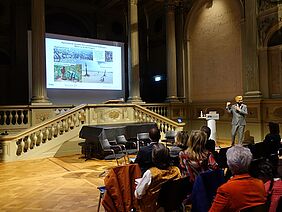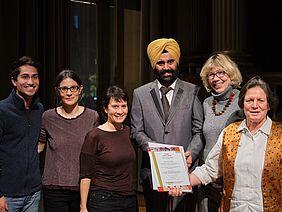(Frick, 09.12.2019) Together with partner institutions, FiBL was able to demonstrate with its long-term experiments that organic farming can be an economically interesting alternative for small farmers due to e.g. a higher income. The SFIAR Research Prize recognises the importance of research results in addressing the negative impacts of climate change among other things. The members of the prize committee also emphasised the innovative and cooperative approach of the experiment and the training of local partners.
High potential
FiBL launched the programme “Long-term farming systems comparisons in the tropics” (SysCom) in 2007 to find out how organic farming can be profitable in tropical areas and what contributions it can make to sustainable development. In India, the cultivation of cotton, soya and wheat is being investigated, whereas in Kenya the focus is on vegetable and maize cultivation. And in Bolivia cocoa production in monocultures and agroforestry systems is being compared.
The results of the research show that organic farming not only improves soil fertility, biodiversity and product quality in tropical regions, but that it can also be of economic interest. The results refute the frequently voiced criticism that organic farming is only for rich countries. In order to fully exploit this potential, support is required in the further development of tropical farming methods, the education of farmers and the institutional framework.
Sustainable production
In addition to FiBL, the SFIAR honoured Janine Steinmann with the 2019 award for her Master’s thesis carried out at ETH Zurich in the framework of the YAMSYS, which focuses on improving soil quality in Yam root cultivation in West Africa. FiBL was awarded the "Team Award" of 10,000 Swiss francs and Janine Steinmann the "Master Thesis Award" of 1000 Swiss francs. The award-winning projects provide a valuable scientific basis for how food production in developing countries can be made more sustainable. The SFIAR Research Award is sponsored by the SDC and the Syngenta Foundation for Sustainable Agriculture.
Further information
FiBL contacts
- Beate Huber, Department of International Collaboration, FiBL Switzerland
+41 62 865 04 25, beate.huber(at)fibl.org - Helga Willer, Communication, FiBL Switzerland
+41 62 865 72 07, helga.willer(at)fibl.org
Supporters
- Liechtenstein Development Service (LED)
- Swiss Agency for Development and Cooperation (SDC)
- Coop Sustainability Fund
- Biovision
Partners
- systems-comparison.fibl.org: Partners on the SysCom website
Links
- systems-comparison.fibl.org: SysCom project website
- YAMSYS project
Video
- youtube.com: Video on SysCom in Kenia
References
- systems-comparison.fibl.org: Publications on the SysCom website





